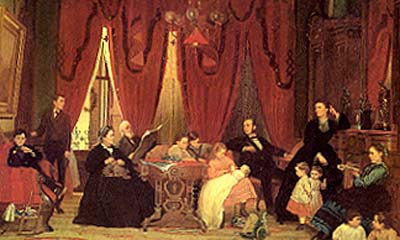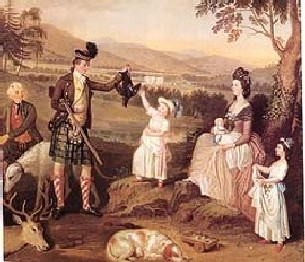 |
Women and Men in Society
The Role of Authority in the Family
Marian T. Horvat, Ph.D.
If you were to choose the principal characteristic needed by the father of a family, what would it be?
Some might say we need prayerful Catholic men, which is certainly true enough. Other Catholic groups call on men to serve as head of the family quite literally, by serving the wife and children. Certainly fatherhood demands self-sacrifice and service, but the emphasis on this role of service follows the modern Vatican II teaching that the husband and wife play equal and complementary roles in a marriage. A great mistake, in my opinion, has been to ignore the traditional emphasis and stress on the role of authority a husband and father should exercise in a family.

Thinking he is doing a good, the father creates a vacuum of authority |
Fearful of appearing authoritative or aloof to their offspring, many young fathers try to be a “good buddy” to their sons and daughters. Playing and joking and making life a game, they teach not only that life is not serious, but that authority is frivolous. The father, instead of showing the serious air of authority a child needs to be calm, stable and secure about his place in life, himself takes on the air of big child, dressing, speaking, inter-acting like a youth, even when he is far from it. He is the Big Boy, his son the Little Boy, and his wife takes on the role of Mother to all.
In this is an inherent disorder. The wife has a difficult time finding the husband to obey and respect. The children begin to think themselves equals to the parents. The harmony and equilibrium of the home are upset, because paternal authority is lacking. We see the disastrous results of this syndrome around us everywhere today.
In a book on the family written in 1910, Msgr. Henri Delassus, a great counter-revolutionary who fought against the advance of Modernism in the Church and society, stated that the vital principle for the sound family is the authority of the father. (1) In my book, Restoring the Family, I translated the chapter entitled “The Authority of the Father, the Piety of the Mother, Respect for the Ancestors.”
It seemed to be quite worthwhile, on this Father’s Day, to reproduce the prophetic words of Msgr. Henri Delassus, that nothing is of more urgency in the family than to restore paternal authority. I offer this excerpt from his work as a gift to Catholic fathers who seek the firm Catholic wisdom of the past to build a sound Catholic future.

The Authority of the Father
Msgr. Henri Delassus
In Athens and Rome, the authority of the father was absolute. In his own household, he was a king. He had a truly sovereign dignity and power, and this power extended even to the right of life and death.

An extended family in which a father enjoyed a truly sovereign dignity and authority |
In Catholic France, the father never had this right, but he was still the first judge of his children. Up until the 18th century, he conserved the right to deprive an unworthy son of his liberty, even if the latter were of age and married, and the king himself placed his power at the disposition of the father seeking justice.
This was what happened when a father asked the sovereign for a lettre de cachet (sealed letter), soliciting the assistance of the royal power against a son when the latter was a cause of dishonor to the family. The king could then send him to a State prison. This custom was acknowledged everywhere, even by the receivers of the said lettres de cachet.
Paternal authority was considered essentially superior to all others, and, for this reason, profoundly respected. “The prince gives orders to his subjects,” says Jean Bodin, “the master to his disciples, the captain to his soldiers ... But to none of these did nature give such authority as to the father, who is the true image of the sovereign God, the universal Father of all things.”
In fact, children should think of their fathers as images of God upon earth. One frequently finds thoughts like the following, which are those of Stephen Pasquier:
“We should consider our fathers like gods on earth, who were given to us not only to transmit life to us and conserve it, but also to sanctify us by a wise instruction.”
Writing to one of his nieces, St. Francis de Sales affirmed: “Behold how you encounter in your father an image of the Eternal Father. For this reason we should honor and reverence the one through whom it so pleased God to give us life.”
An authority with such a religious character should inspire respect and make obedience easy, stimulating devotion to the family and maintaining harmony among the children. Throughout the 18th century, however, paternal authority was deteriorating because of egalitarian new customs, and the National Convention ended by destroying it almost completely. (2)
From the time that men who were imbued with the spirit of Rousseau – that is, men who wanted to see the individual, not the family, as the basic element of society – assumed the legislative power, they strove to enact laws to abolish a father’s authority over his children older than age 21 and weaken it over those younger. “The imperious voice of reason,” proclaimed Cambacérès, a famous revolutionary legislator, “must be heard. Paternal power no longer exists. A man should not have direct power over another, even if it be his own child.”
Socialism, in its turn, sought to consecrate these propositions in the law. In his book Le socialisme intégral, Benoît Malon said:
“What must happen is to completely abolish the authority of the father and his almost royal power in the family. In effect, equality only will be perfect if this is achieved. Aren’t the children of as great a value as the parents? By what right do the latter command the former? Enough of obedience! Enough of inequality!”
Today, the father finds himself before his children in a situation similar to that of a sovereign deprived of any means to repress the rebellion of subjects. Literature and the media reinforce such laws, working against adults and elders with affirmations that reason belies. Even the schools, through the knowledge transmitted in the order of material facts, persuade the children that they have a true superiority over the parents, who are often ignorant of such learning.
In this way, paternal authority is only a shadow of what it was before the French Revolution. Tocqueville applauded this change:
“I think that as the laws and customs become more democratic, the relations of fathers with their sons will become more intimate and affectionate. As law and authority manifest themselves less, confidence and affection will increase. And while it is true that the social bond will weaken, the natural bond will grow stronger."
The facts contradict such predictions, which, moreover, reason cannot admit. Today, everyone deplores the rupture of family bonds and its consequences: the loss of respect and obedience of children toward their parents, the emancipation of the former, the extreme corruption of customs, and finally, the general decadence of the people.
In the upper classes appearances can be better kept, (3) but the reality is no better. Stimulated by the egalitarian doctrine of the age, the youth are revolting frequently against the discipline of the home. More and more their primary concern is to enjoy life in idleness and licentiousness, dissipating the wealth reserved for them by the work of their ancestors.
It is, therefore, of pressing urgency to restore paternal authority. No one has a title more legitimate. Nothing is more necessary.
Paternal power is that which, in the natural order, most clearly reveals its divine institution. It is even above the power of the king, which limits itself to directing a society to which one cannot claim rights based in nature. The authority attributed to the father, however, is a legitimate consequence of this natural dignity: that of continuing the work of creation, giving life and new beings gifted with moral consciences and capable of being raised to the knowledge and love of God.

Paternal authority properly exercised provides serenity and order to the family, and society. |
Invested with such high legitimacy, this authority imposes itself by the need to assure the existence of the children, who are powerless to conserve it by themselves. It is imposed by paternal love itself, the most enduring and least egoistic of human affections, because fathers perceive that, without such authority, it would be impossible to educate children who have the stain of original sin. Finally, it is imposed by the service that it renders to society, transmitting through education the treasure of moral truths and experiences accumulated through the centuries.
Thus, paternal authority was always and everywhere – except among us at the present hour – considered a foundation stone of the social order, necessary to all peoples and in all times as one of the invariable elements of the social constitution.
Writing about the excellent studies of Le Play on what composes the social body, Charles de Ribbe came to this conclusion demonstrated absolutely by experience: if societies are the image of the families that compose it, families are, in their turn, those in which paternal authority is exercised. He said:
“If we return authority to the father, we will restore the ministry of God in the temporal order .… The more time that passes, the more we become aware that it is necessary to return to the family its autonomy. It is impossible to constitute good governments with men given up to error. In the sad state in which we find ourselves, salvation can only come from that unique authority, which, by virtue of natural law, remains devoted to its subordinates. Only paternal authority can accomplish that which is superior to the force of any public authority
1. Henri Delassus, L'esprit familial dans la maison, dans la cité et dans l’Etat (Lille: Société Saint Augustin, Desclée de Brouwer, 1910, apud José Narciso Pinto Soares, Espírito de família, Collection Talent de Bien Faire, Barcelos: Companhia Editora do Minho, n.d.). Msgr. Delassus was a relentless polemecist and defender of the Church against the advance of Modernism during the pontificates of Pius IX, Leo XIII, St. Pius X and Benedict XV. One of his better known works is La conjuration anti-chrétienne.
2. The author is referring here to legislation that robbed the family of its independence by replacing the authority of the father with that of the State. For example, Delassus laments the parent’s loss to educate his children: “Today the family depends so much on the State that the father does not even have the liberty to educate his children as his conscience and the traditions of his family indicate to him. The State has taken them from him, with the legally proclaimed objective of transforming these children into men without God, and consequently, men without morals” (Ibid., chap. 7).
3. Msgr. Delassus was writing these words at the beginning of the 20th century. Today, it can be affirmed without hesitation that a generalized breakdown in the authority of parents is experienced by all classes, not only in France, but in all the countries of Western Civilization, including the United States. Charles de Ribbe, La société provençale à la fin du Moyen Age (Paris, 1897).

Posted June 19, 2004

Related Works of Interest
|
|
Women and Men | Cultural | Home | Books | CDs | Search | Contact Us | Donate

© 2002- Tradition in Action, Inc. All Rights Reserved
|
 |
|